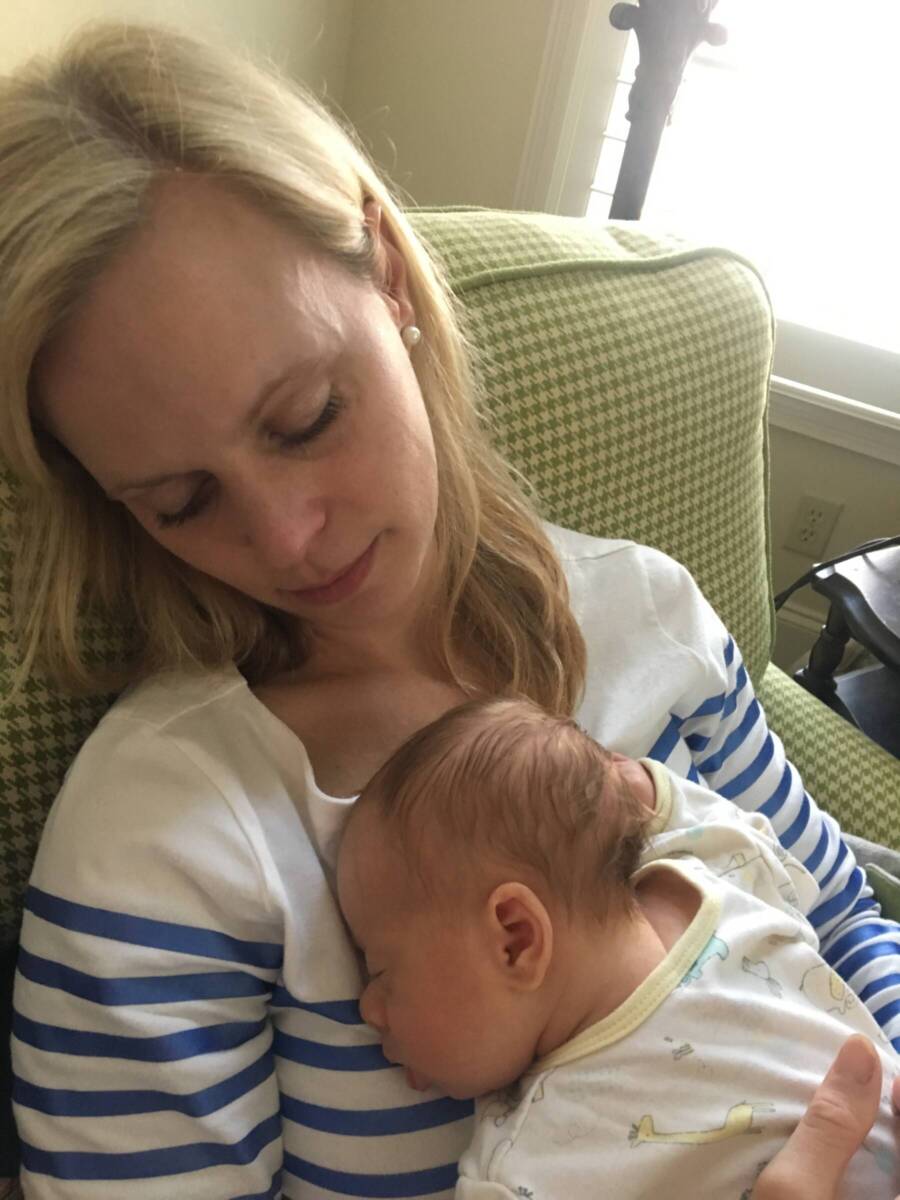Running After C Section: What to Know
A C-section, or Caesarean, is a major abdominal surgery that delivers a baby through a surgical incision. The process of being pregnant places a lot of demand and changes on our bodies as does being a mother to an infant. Compound that with a major surgery, and time and grace are needed for our bodies to heal. Therefore, to begin running after C section requires more time than a woman who delivered vaginally.

Many variables, including the type of C-section you had (emergency or planned), can also impact how long it will take before you can safely workout after cesarean. In this article, I will share how to safely recover from your C-section, so you can begin your journey back to running after C Section.
Skip Ahead:
Note: I am a running coach, not a doctor (though I did speak with one for this article). Talk to yours before running after c section.
When can I run after a c-section?
Eight weeks at minimum is when you can run after c section. As a running coach, I will not work with a runner who has had a c-section until at least 8 weeks postpartum and has the guidance of a pelvic health physical therapist.
It is generally assumed that women can begin running after having a baby at 6 weeks postpartum, and that an extra 2 weeks is needed for the C section scar to heal and tissue to remodel. However, these “guidelines” are, in many cases, misguided.
Numerous variables can affect the timeline for returning to running after C section including:
-
the type of C-section (elective vs. emergency are generally easier to recover from because those with emergency c-sections probably pushed some),
-
prior level of fitness,
-
mental well-being,
-
family support,
-
sleep quality,
-
and use of pain medication.
Research shows that at 6 weeks postpartum, there is uterine scar thickness from the C section surgery, and the abdominal fascia has only regained 51-59 percent of its tensile strength. At 7-9 months postpartum, about 73-93 percent of tensile strength has been recovered.
Running after c section before the scar is properly healed and the tissue remodeled may negatively affect internal organs and muscles due to the location of the incision. Therefore, it is critical a woman allows time for her cesarean scar to heal as well undergo proper rehabilitation. (The fact that millions of women each year are given little to zero guidance from their health care providers in how to rehab postpartum and ready the body for exercise is ridiculous, by the way.) Read on to learn about what this entails & check out my article on whether 6 weeks is too soon to return to running after having a baby.
7 Tips for Running After a C-section
1. Consult your healthcare provider.
Even if your OB gyn clears you to start running after C section, consult with a pelvic floor physical therapist (find one here) to assess your pelvic floor, core, and C section scar.
You are not ready to run after C section if any of the following symptoms are present, according to a landmark postpartum running guide:
-
- Urinary or fecal incontinence
-
- Pressure, bulge, dragging in the vaginal area
-
- Vaginal bleeding postpartum (not menstruation related)
-
- Musculoskeletal pain including in the pelvic girdle pain and low back pain
-
- Reduced pelvic floor endurance
-
- Abdominal pain and scar tissue stiffness
-
- Red, leaking, or inflamed cesarean scar
-
- Untreated Diastasis Recti (separation of the abdominal muscles which is common post c-section)
C-section pain typically decreases over the first five to ten days.
2. Begin pelvic floor exercises
With the clearance and guidance from your pelvic floor PT or pelvic floor program, you can begin exercises to target the strength and endurance of your pelvic floor and core
How to strengthen core after C section?
Some of these exercises can include a pelvic tilt, bent knee drop out, side lying abduction, pelvic floor breathing patterns, mobility, and light stretching. Your pelvic floor PT can prescribe specific exercises for your body. Dr. Carrie Pagliano, doctor of physical therapist, says she aims to see her patients between 2 and 4 weeks to provide basic abdominal coordination and breath exercises.
3. Begin walking
The best workout after cesarean to ready the body for running is walking. Walking is a low-impact exercise, but it’s still load-bearing in a comparable movement pattern to running. Walking strengthens your bones and muscles, including your pelvic floor and core, in a way that preps the body for running.
I recommend for my athletes who want to start running after c section to gradually build up the time they can comfortably walk to about 45 minutes before we introduce a run/walk program (plus pelvic floor work).
Again, any pain during walking, including around the C section scar, is a red flag that more recovery is needed before you progress your fitness after c section.
4. Progress strength training
As a newly postpartum mother builds her walking program, she can progress her strength training starting with bodyweight and progressing to the weight of her baby.
Good exercises to include could be:
-
- Squats progressed to single leg squats
-
- Lunges
-
- Bridges
-
- Dead lifts
-
- Arm swings
-
- Single leg calf raise
-
- Single leg bridge
-
- Single leg sit to stand
5. Scar mobilization
It’s recommended that around the 6-week mark, women work with a physical therapist or healthcare professional on “scar mobility.” Mobilizing the scar can reduce inflammation, fibrosis and improve tissue remodeling.
What the heck is scar mobilization? Scar mobilization is a massage of the scar. Seven layers of tissue are cut during a C-section. A massage involves mobilization the tissue in three sections: the superficial skin and fat, muscles, and connective tissues, and then the deep tissues.
Scar mobilization involves lying down on a pillow and rubbing the scar with oil (such as olive oil or jojoba oil). You will begin lightly and as the scar heals, can progress to a deeper massage. Again, perform this with guidance from your healthcare professional.
6. Start power walking and cross-training
Once you can walk for 30-45 minutes with no discomfort, you can begin power walking (walking at a brisk pace—likely around 15 minutes per mile). Power walking up hills is an especially great workout for postpartum runners as it strengthens the cardiovascular system and musculoskeletal system with less impact.
You can also begin doing more intense cardio cross-training workouts (if they feel comfortable) including swimming, spinning, and the elliptical.
At this point, you will also want to progress your strength training and be able to perform the following with no issues, pain, or discomfort (if you are working with a PF PT, they will do this as part of your running assessment—earliest at the 6 week mark):
-
- Single leg balance 10 seconds
-
- Single leg squat 10 repetitions each side
-
- Jog in place for 1 minute
-
- Forward bounds for 10 reps
-
- Hop in place for 10 reps single leg
-
- Single leg “running man” 10 reps each side
(Check out My Complete Postpartum Running Guide for more info on how to get started.)
7. Start slow with running
When power walking for 45 minutes feels less challenging and you can perform the above exercises, you may be ready to start running! But this doesn’t mean it’s time to hit the ground running full throttle.
Running after C section – just as you would with any surgery or after a running injury – requires starting with run/walk intervals. An example of how to introduce running after C section includes:
-
- Walk for 5-10 minutes
-
- Run for 1 minute/Walk for 1 minute
-
- Repeat 6 times
-
- Walk for 5-10 minutes
Repeat a workout like this on non-consecutive days for 2-3 sessions before progressing in duration of the running intervals or total number of running intervals. A running coach such as myself can guide you.
During this time, you and your PF PT should continue to rehab and monitor your scar and scar mobility; pelvic floor and core strength, endurance, and activation; your breath; functional strength; and ab separation.
The process of running after a C section can take anywhere (on average) of 8 to 42 weeks.
7 Benefits of Running After a C-section
There are many benefits of running after c-section. Here are some:
-
- Enhanced cardiovascular health and function
-
- Improved bone density and less bone loss during lactation
-
- Encourage healthy habits in children
-
- Promotes healthy body weight
-
- Decreases risk or severity of postpartum depression and encourages positive well-being
- Improves overall health and protects against chronic disease, bone fractures, and cancers.
Potential Risks and When to Stop
Running after a c-section before your body is healed can lead to issues and injuries to the muscles and organs around your scar, as well as pelvic floor and running injuries.
Dr. Pagliano warns: “Often women feel fine, but they don’t realize if a scar opens up, it will put them back a few weeks while the tissues start the healing process again.”
She also adds that women with C-sections are more pre-disposed to diastasis recti, and may typically have more difficulty “finding” and reconnecting to their deep abs. If they skip relearning that muscle coordination, moms returning to running or workouts often complain of back or pelvic pain.
You should stop running after having a c-section and call your doctor if you experience any of the following during or after running:
-
- Pain in your low back and/or abdominal wall
-
- Fecal or urinary incontinence
-
- Feelings of heaviness or dragging in the vaginal or perineum area.
-
- Visible bulge along the linea alba in the stomach
-
- Irritation of the c-section scar
Workout after a Cesarean but Take It Slow
Bottom line: Workout after a Cesarean but take it slow! C-sections are major surgeries—combine that with not sleeping, additional stress, and carrying a growing baby for 9 months—and your body has a lot to contend with.
Try to be patient and meet it where it’s at. When you feel mentally and physically ready to begin your exercise routine, recruit help from a pelvic floor specialist (ideally one who works with runners—you will not regret this decision!), and begin your journey back to the roads.
Remember, running isn’t going anywhere. It will always be there for you when your body is ready. If you need help returning to running postpartum, I would love to help you! Also, please comment below about your experience to create connection among other mother runners!






